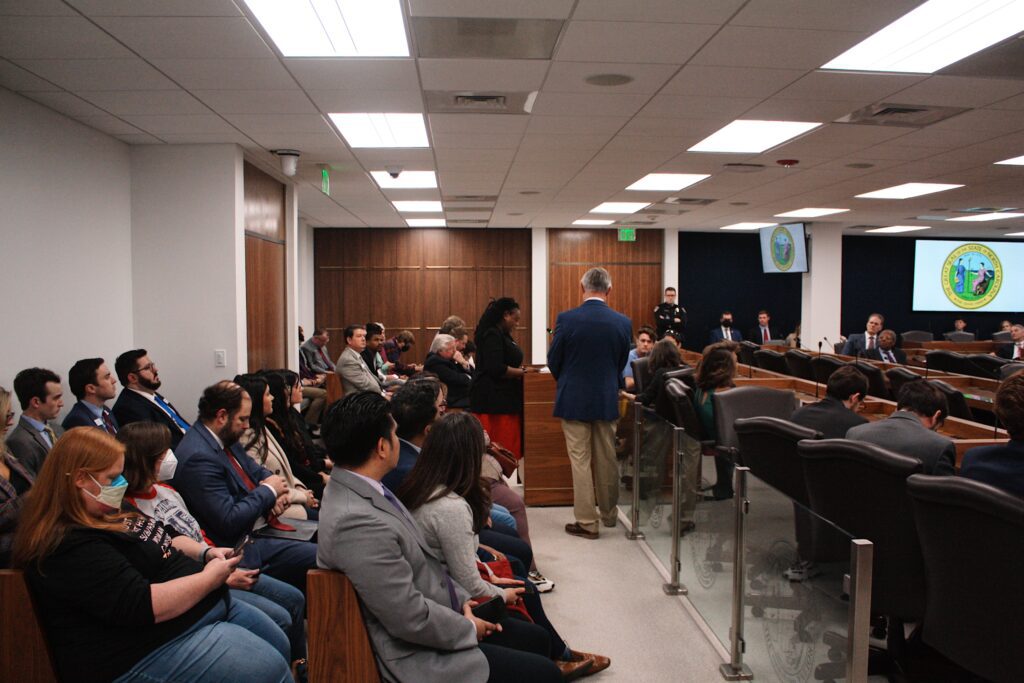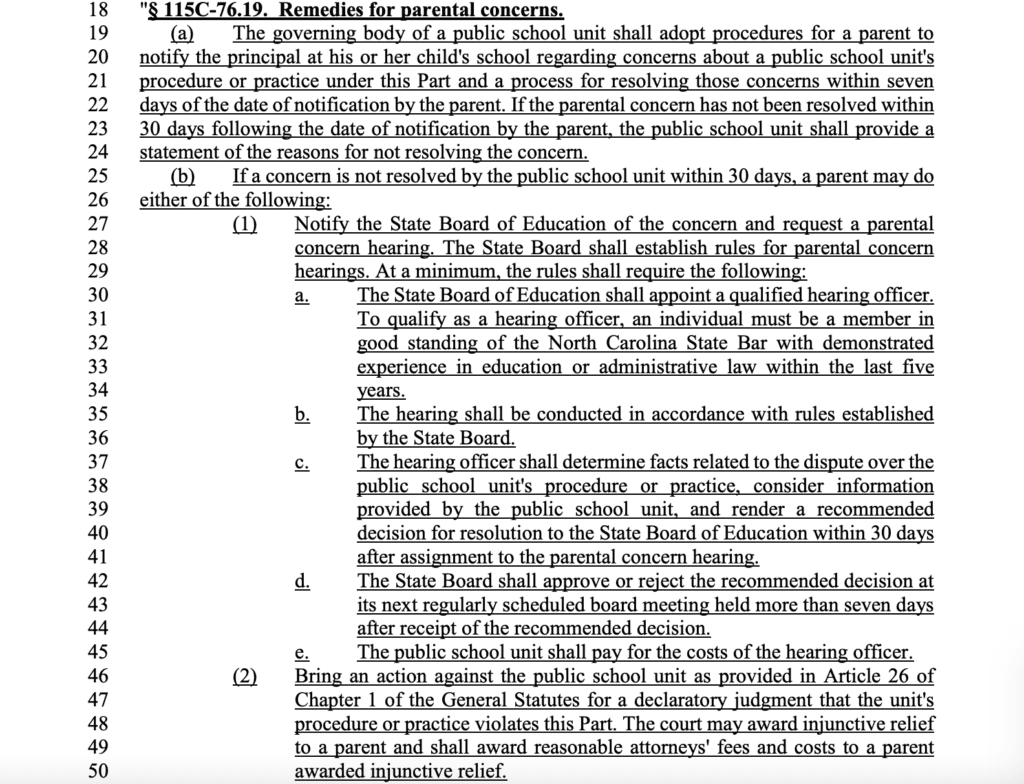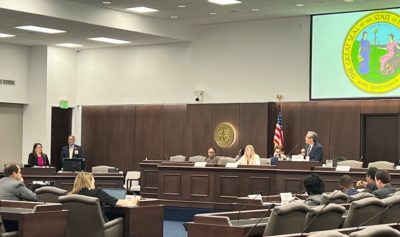
|
|
Update, Feb. 6: The Senate rules committee gave the bill a favorable report, and the legislation now heads to the Senate floor.
Update, Feb. 2 at 12:00 p.m. — The Senate’s health care committee heard the bill, focusing discussion on the health care-related provisions. The bill received a favorable report and is now headed to the Senate’s rules committee.
The North Carolina Senate’s education committee gave a favorable vote to the Parents’ Bill of Rights on Wednesday, Feb. 1, after Senate Republicans introduced an updated version of the controversial legislation on Tuesday.
The bill would ban curriculum on gender identity, sexual activity, or sexuality in kindergarten through fourth grade and allow parents to review all materials used in class, among other things.
Last May, the House did not take up a nearly identical bill, which passed the Senate. At the time, Democratic Gov. Roy Cooper criticized the bill, and Republicans didn’t have the numbers to override his likely veto. Now, they’re only one vote shy of being able to override a gubernatorial veto.
The updated bill, Senate Bill 49, is “an act to enumerate the rights of parents to direct the upbringing, education, health care, and mental health of their minor children.” It is sponsored by three Republicans: Sens. Amy Galey, R-Alamance, and Michael Lee, R-New Hanover, who are co-chairs of the Senate education committee, and Sen. Lisa Barnes, R-Franklin.
“Parents are not an afterthought in public education,” Galey said during a press conference before the committee meeting. “Parents do not surrender their children to government schools for indoctrination opposed to the family’s values. The government is not a partner in raising our children.”
Last year, the vast majority of public speakers opposed the bill, saying it could harm LGBTQ+ students. The bill followed moves by other states to institute legislation with similar titles and contents. One of the more controversial was a Florida bill opponents dubbed “Don’t Say Gay.”
On Wednesday, Galey and Lee stressed that SB49 increases transparency for parents and its curriculum prohibitions focus only on K-4 students. Last year’s bill focused on K-3 students.
Elementary schools should focus on math and reading, Galey said during the press conference.
“Teaching about gender identity, sexual activity, or sexuality has no place in the K-4 curriculum,” she said. “Teachers must not determine when it is appropriate to discuss these topics with our youngest, most impressionable children.”
The bill will now go to the Senate’s health care committee, which meets Feb. 2 at 10 a.m. If that committee gives a favorable report, it must then go to the Rules and Operations committee of the Senate. After Wednesday’s education committee meeting, Galey told EdNC the bill was not fast-tracked but “ready to go” and could possibly be passed as early as next week.
What does the bill say?
Senate Bill 49 lists the same 10 parental rights as last year’s bill. Those rights include the right to direct the education/care of their child, to direct the upbringing and moral or religious training of their child, and to access and review all education and medical records related to their child (with listed exceptions), among others. You can read the full list of rights here.
The bill says a state employee “who encourages, coerces, or attempts to encourage or coerce a child to withhold information from his or her parent may be subject to disciplinary action.” A parent, as defined by the bill, is any “person who has legal custody of a child.”
The governing bodies of public schools must also adopt procedures to notify a parent about their child’s physical and mental health, including any school health care services they use, changes to their well-being, or requests to change a student’s pronouns.

On Wednesday, public speakers said the pronoun requirement will harm many LGBTQ+ students. The majority of the 15 speakers during the committee’s public comment opposed the bill, and three spoke in support of it.
Ann Webb, senior policy counsel at the ACLU of North Carolina, said the organization is particularly concerned about the bill’s requirement that teachers “out students who are exploring our identity by using a particular name or pronoun.”
“Students have a constitutional right to share or withhold information about their sexual orientation or gender identity from their parents, teachers, or other parties,” Webb said during public comments. “This bill undermines certain children’s safety and is ultimately part of a national campaign to erase the existence of LGBT students and adults.”
At the end of the meeting, Galey thanked the public for their comments and said that sexual orientation is not addressed in the bill. She added that the requirement to share “pronouns and the names may or may not be indicative of an issue for a child.”
The bill lists the following parental “legal rights with regards to their child’s education.”
The right to consent or withhold consent for participation in reproductive health and safety education programs.
The right to seek a medical or religious exemption from immunization requirements.
The right to review statewide standardized assessment results as part of the State report card.
The right to request an evaluation of their child for an academically or intellectually gifted program, or for identification as a child with a disability.
The right to inspect and purchase public school unit textbooks and other supplementary instructional materials.
The right to access information relating to the unit’s policies for promotion or retention, including high school graduation requirements.
The right to receive student report cards on a regular basis that clearly depict and grade the student’s academic performance in each class or course, the student’s conduct, and the student’s attendance.
The right to access information relating to the State public education system, State standards, report card requirements, attendance requirements, and textbook requirements.
The right to participate in parent-teacher organizations.
The right to opt out of certain data collection for their child.
The right for students to participate in protected student information surveys only with parental consent.
The right to review all available records of materials their child has borrowed from a school library.
Senate Bill 49, Version 1
What’s new about this bill?
The updated bill prohibits instruction on gender identity, sexual activity, or sexuality in K-4. This is an update from the “sexual orientation” language used in last year’s bill.
“Children come from a variety of different family structures, and all people should feel welcome in the public classroom,” Galey said.
In an interview with EdNC after the meeting, Galey said curriculum with LGBTQ+ people is allowed under the bill, so long as sexual activity or “behavior” is not a part of the material.
Curriculum, as defined by the bill, includes “the standard course of study and support materials, locally developed curriculum, supplemental instruction, and textbooks and other supplementary materials.” It does not include responses to student-initiated questions.
Galey and Lee said multiple times on Wednesday that the Parents’ Bill of Rights is meant to make all parents aware of their rights. There are only a few additional rights listed in the bill to those schools already provide, Galey told EdNC. Those additional rights include knowing the library books your child checks out, allowing parents to review all curriculum, and establishing remedies and timelines for parental concerns.
The review of curriculum includes “all textbooks and supplementary instructional materials that will be used in their child’s classroom.”
The bill also mandates school governing bodies to adopt procedures for parents to notify principals regarding concerns about curriculum. A process to resolve concerns should take place within seven days of the date of notification by the parent, the bills says. After 30 days, “the public school unit shall provide a statement of the reasons for not resolving the concern.” At that point, parents can also request a “parental concerning hearing” with the State Board of Education.

Reactions to SB49
A few Democratic committee members said they’re disappointed this is the first bill the committee is addressing this long session, amid many other education priorities like teacher attrition and school achievement.
“This is a priority. This is not the first priority,” Galey said in response.
Galey said she hasn’t talked with any Democratic colleagues about bipartisan support for the bill. She later added, “It baffles me to think this bill is divisive.” Young children should never learn about sexuality and sexual activity in a public school classroom, she said, citing anecdotal evidence of such cases.
“I am surprised that you are surprised that this is controversial,” said Sen. Natasha Marcus, D-Mecklenburg. “I believe we’re going to continue to hear from the public. And I hope that the input we receive from the citizens of North Carolina is also considered as this bill moves through.”
Sen. Natalie Murdock, D-Chatham, asked how the bill might strain teachers, citing concern for teacher retention. Murdock said she hopes for future bipartisan efforts to retain teachers and increase pay – “issues not addressed by this legislation.”
“One of the things I understand without having any statistical evidence to back it up, is teachers get frustrated because they feel like they’re being asked to be social workers,” Galey said in response. “This bill is going to acknowledge that they’re not counselors, and they shouldn’t be doing these jobs.”
Tamika Walker Kelly, president of the N.C. Association of Educators, said during the public comments, “All are welcome – that is a core belief and tenant of our North Carolina public schools. Instead, this bill tells portions of our communities, including your constituents, especially those that identify as LGBTQ+, that they are not welcome. … And at the end of the day, the Parents’ Bill of Rights does nothing to address very real issues that are facing our educational system in North Carolina.”
Republican Lieutenant Governor Mark Robinson issued a statement, saying, “Over the last few years, parents have been given an inside look into their children’s classroom, voiced their concerns, and have felt ignored by bureaucrats. Now is the time for us to step up and ensure their voices are heard, and this bill does exactly that.” Read his full statement here.
Before adjourning, Lee said the bill was not brought forward to attack or demonize anyone. He encouraged members of the public to read the bill or bill summary to clarify many of the issues raised by opponents.
The Senate’s health care committee meets to take up the bill Feb. 2 at 10 a.m.




